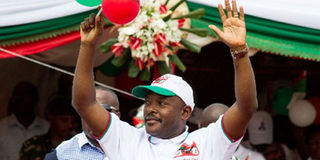If Burundi continues killing her civilians, AU must ask: What would Nyerere do?

Burundi President Pierre Nkurunziza. In his first reaction to the AU’s plan to send 5,000 troops to stop the cycle of killings in Burundi, Nkurunziza openly declared that his troops would fight those forces. PHOTO | AFP
What you need to know:
- In his first reaction to the AU’s plan to send 5,000 troops to stop the cycle of killings in Burundi, Nkurunziza openly declared that his troops would fight those forces.
- The security forces, meanwhile, are killing young men in neighbourhoods which have been the centre of protests to Nkurunziza’s third term bid with near total impunity.
- Sending troops to take on a despot takes the sort of courage that Nyerere showed in the 1970s.
President Pierre Nkurunziza has handed the African Union an interesting problem.
In his first reaction to the AU’s plan to send 5,000 troops to stop the cycle of killings in Burundi, Nkurunziza openly declared that his troops would fight those forces.
What will the AU do? There is still room for a negotiated way out of the crisis.
It is always wisest to find a political solution before too much blood flows and the parties become too bitter to accept compromise.
But what if Nkurunziza shows no inclination to soften his position and does not rein in the security forces that have been killing innocents or stop figures like the Senate president Révérien Ndikuriyo who have been warning that regime opponents will be “sprayed like cockroaches”?
The great question is whether regional leaders will have the courage displayed by Julius Nyerere in 1978 when he sent his troops to Kampala to dispatch the Ugandan despot Idi Amin Dada to a miserable exile in Saudi Arabia.
Amin had never seen it coming. The Organisation of African Unity was widely dismissed as a “trade union of dictators” because of how much it emphasised state sovereignty and “non-interference” in the affairs of others.
So Amin felt sheltered enough to insult everyone that criticised him.
In one note to Nyerere he wrote: “I want to assure you that I love you very much and if you had been a woman I would have considered marrying you although your head is full of gray hairs. But as you are a man that possibility does not arise.”
He dismissed Zambia’s Kenneth Kaunda as an ‘’imperialist puppet and bootlicker’’ and his crude insults even flew across continents, saying during celebrations to mark Queen Elizabeth’s silver anniversary that he expected her to send him “her 25-year-old knickers’’.
WORST MISTAKE
More seriously, of course, his security forces were busy murdering tens of thousands of civilians with little logic dictating those chosen for extermination.
Amin overreached himself when he sent troops to occupy the Kagera region in Tanzania.
Nyerere mobilised his troops and pushed the Ugandan soldiers back.
He didn’t stop there. In the first development of its kind in Africa, and in total disregard of the OAU’s “non-interference” mantra, his troops marched to Kampala and toppled Amin.
Can today’s leaders show similar courage?
A new briefing paper “My children are scared: Burundi’s deepening human rights crisis” released by Amnesty International paints a very worrying picture of the situation there.
Virtually all independent voices – the journalists, lawyers, businessmen – have been forced to flee into exile and all independent media outlets shut down.
The security forces, meanwhile, are killing young men in neighbourhoods which have been the centre of protests to Nkurunziza’s third term bid with near total impunity.
Amnesty records that on December 11, hours after an abortive attack on two military installations, the police went into the neighbourhoods of Nyakabiga, Musaga, Mutakura, Cibitoke, Jabe, and Ngagara where dozens of young men were pulled from their homes and shot at close range.
Human rights campaigners who have stood up to the regime like Pierre Claver Mbonimpa have been forced into exile, in his case after gunmen shot and badly wounded him.
NYERERE'S BOLDNESS
Mbonimpa has become an unwilling symbol of the regime’s brutality after his son, Welly Nzitonda, and son-in-law Pascal Nshimirimana were killed by the security forces weeks after Mbonimpa left the country for treatment in Belgium.
This is not a genocide. It is a refreshing thing that the opposition to Nkurunziza is united across the Hutu-Tutsi ethnic divide although some in government have sought to exploit ethnic divisions.
The AU will suffer grave embarrassment if there is a turn to mass killings in Burundi.
Sending troops to take on a despot takes the sort of courage that Nyerere showed in the 1970s.





